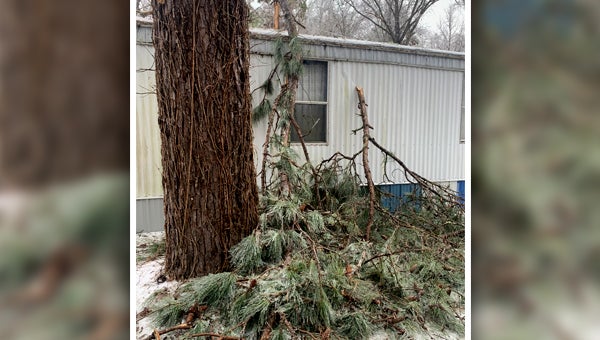Insurance agent shares advice on handling storm damage
Published 4:23 pm Thursday, February 18, 2021

- A tree is seen fallen on a home on Freda Lane in Warren County early Thursday morning. (Regina Smith/The Vicksburg Post)
Having an ice-covered tree fall on your home during a winter storm is not something anyone wants to deal with. If it does, however, there are some do’s and don’ts to follow in the aftermath that can make clean up and recovery go a bit smoother.
Vicksburg State Farm Insurance agent Robyn Lea said the first thing to keep in mind when removing debris is to not make the damage worse. Haphazardly removing ice and tree limbs from roofs can cause damage to shingles that will be even more expensive to fix. She advised homeowners to get help and not work alone during the initial phases of clean up.
“If people get on the roof they need to avoid shingle damage. Don’t use picks and shovels to clear the ice. Then call their agent,” Lea said. “You don’t want to cause damage that is not already there by creating damage to the house or themselves.”
Step two in the process, Lea said, is to document as much of the damage as they can with photos and videos. That will make processing a claim easier.
“You need to document the damage as best you can. If you can get pictures, document it that way,” Lea said. “If you have a loss to the contents of your home, that needs to be documented as well.”
Finally, she asked homeowners to have patience with their insurance agents. This week’s winter storm battered most of Mississippi, which means agents will be processing thousands of claims in the coming days and weeks. Contractors and repairmen who are suddenly swamped with work will also be hard to find once a claim is approved.
“When you have something like this that is widespread and lots of people need assistance, it’s going to take a while,” Lea said.
Besides handling the paperwork of an insurance claim, Lea said there are other things homeowners should keep in mind in the aftermath of a natural disaster. She implored residents to be safe when using generators, space heaters and power tools.
An inexperienced person using a chainsaw to clear a tree, for example, could lead to even more problems.
“It’s just another thing people need to be smart about. If you don’t have experience with a chainsaw, let someone else use the chainsaw,” she said.
Space heaters and generators, meanwhile, come with a laundry list of hazards ranging from fire to electrocution and carbon monoxide poisoning. Lea urged homeowners to keep generators outside and with plenty of “breathing room” for ventilation.
“Your garage is not the place for a portable generator because of the carbon monoxide fumes. You need to give a generator adequate breathing room. At least four feet on each side,” Lea said. “People tend to put them in their garages because they’re easy to take care of there, but you don’t want to do that.”
Wet hands can be an electrocution hazard near generators, and wet clothes left to dry in front of space heaters are a fire hazard. Flammable items left on or near a hot generator can cause a fire, as can plugging the generator into a wall outlet.
“Remember that even though it’s a generator, you’re still dealing with electricity,” Lea said.
Lea said insurance claims for fires caused by generators are rare in most years, but also noted that weeklong winter storms like the one Vicksburg is enduring are also quite unusual.
“We haven’t had many claims, but we’re not often in a situation where we’re having to use generators for extended periods of time,” Lea said.






